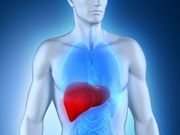Obeticholic acid linked to decrease in alkaline phosphatase and total bilirubin levels
THURSDAY, Aug. 18, 2016 (HealthDay News) — For patients with primary biliary cholangitis, obeticholic acid is associated with a reduction in alkaline phosphatase levels, according to a study published in the Aug. 18 issue of the New England Journal of Medicine.
Frederik Nevens, M.D., Ph.D., from the University Hospitals KU Leuven in Belgium, and colleagues conducted a randomized trial involving 216 patients who had an inadequate response to ursodiol or found the side effects unacceptable. Participants received either obeticholic acid 10 mg (10 mg), obeticholic acid 5 mg with adjustment to 10 mg (5→10 mg group), or placebo.
The researchers found that the primary end point of an alkaline phosphatase level of less than 1.67 times the upper limit of the normal range was 46 and 47 percent in the 5→10 mg and 10 mg groups, respectively, and 10 percent in the placebo group (both P < 0.001). Compared with the placebo group, patients in the 5→10 mg and 10 mg groups had greater decreases in the alkaline phosphatase level and total bilirubin levels, respectively. There was no significant difference for changes in noninvasive measures of liver fibrosis between either treatment group and the placebo group at 12 months.
“Obeticholic acid administered with ursodiol or as monotherapy for 12 months in patients with primary biliary cholangitis resulted in decreases from baseline in alkaline phosphatase and total bilirubin levels that differed significantly from the changes observed with placebo,” the authors write.
The study was funded by Intercept Pharmaceuticals, the manufacturer of Ocaliva (obeticholic acid).
Full Text (subscription or payment may be required)
Editorial (subscription or payment may be required)
Copyright © 2016 HealthDay. All rights reserved.








